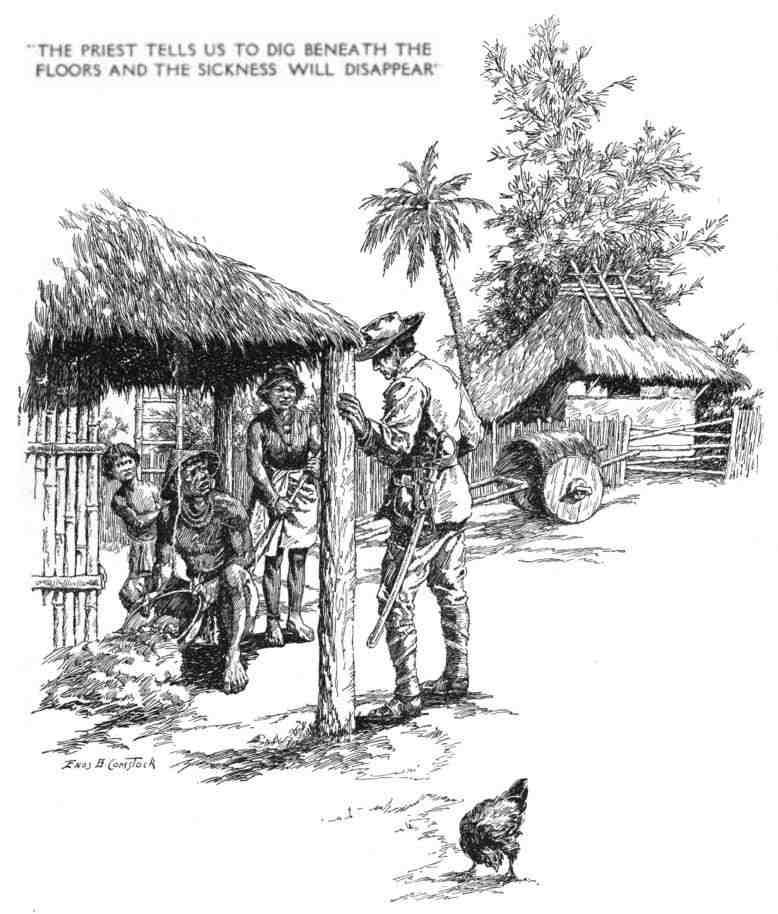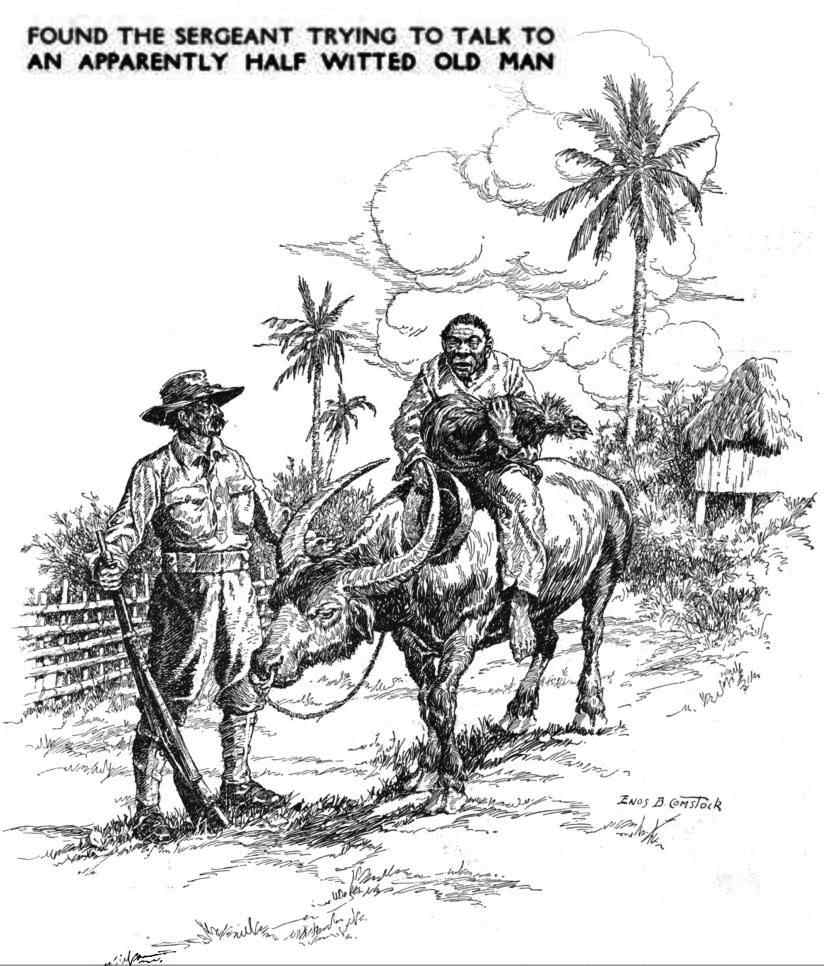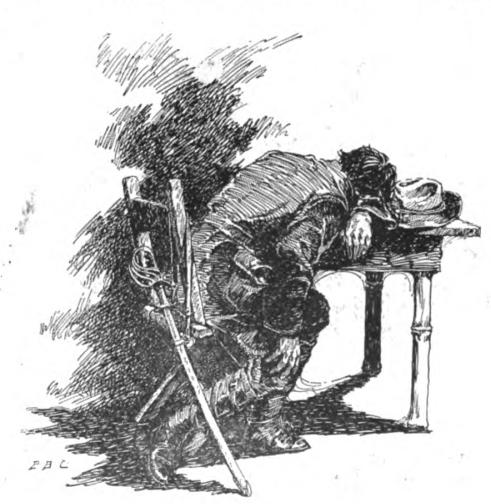
About Mcray
LUCK is a mighty queer thing!
You take the case of Corruthers, for instance. Corruthers got a medal of honor at Santiago, for poking an eyelash from behind a two-foot log, and yelling to his colonel to roll the other way, when the Spaniards had got his range and were dropping Mauser bullets ail around him. Didn't do anything especially brave, nor accomplish any very useful result. For the colonel died of apoplexy a year later in a firemen's parade at Goshen, Ind.
Now take the case of McRay, on the other hand.
In the Philippine Islands is a town called Calamba, and you can find it by turning to the right after you reach Manila and following your coat buttons for about thirty miles. Some ten years ago, the country about Calamba was infested with some of the most bloodthirsty of the guerrilla bands that made life a burden for us out there. And the boss guerrilla-man was named Malvar. We had been chasing Malvar steadily for many months, but somehow or other he always managed to slip through the net we had spread for him. And each failure had been followed invariably by renewed activity on the part of Malvar and his band, till finally there was hardly a carabao left in the whole district, and the friendly natives were atraid to go more than a mile from town to work in the rice fields. District Headquarters was up in the air, and the colonel was getting the prod regularly for not rounding up Mr. Guerrilla-man.
"I often pictured to myself what Malvar must look like. A wiry young man of perhaps thirty years of age, riding the best horse that the district produced, and, of course, always accompanied by an orderly. Knowing, as I thought I did, the Filipinos' love for pomp and display, I could picture him in no other way. "
Charles Edward Hay
About this time, McRay joined us as a goat second-lieutenant from civil life. He didn't know an outpost from straightup, and thought a cavalry screen was a sort of lattice-work put up to hide the stables from the officers quarters. He was an energetic youngster, however, and boned his books and his drill while the rest of us lounged about half-dressed and cursed the heat and the isolation. He was not a college man. In fact, we had it pretty straight from a man who knew his family back in the States, that he had taken scarcely more than a nibble at high school, when his father had been blown up in an explosion of some sort, and McRay had been compelled to drop his books and go to work, Then the insurrection broke out and a Congressman who had known and liked his daddy, had seen to it that he was given a commission in the army. So he was sent out to us there at Calamba, about as ignorant a shave-tail as ever had “lieutenant” engraved on his visiting card. But we liked him because he took his job seriously, and we could see that he had just the stuff in him to make him a credit to the regiment.
There was a good-looking young native living in a small settlement about three miles from Calamba, who often acted as interpreter for us. This interpreter had a child, a cute little rascal about eight years old, who was very sick. And no wonder, with nothing but musty rice to eat and mighty little of that. The interpreter went to the native doctor, and the native doctor prescribed a diet of milk. As well have prescribed radium, for Malvar's band had run off all the cows. The interpreter really loved the little fellow and his distraction and grief were genuine.
McRay happened to be passing with a patrol, just after the native doctor had prescribed the milk diet. The interpreter ran out of his shack and tried to kiss McRay's hand, and began to shed his troubles. McRay wasn't strong on Spanish, but he caught the words niño and infermo and thought it was the customary sick-child overture to a touch. He began to feel in his pocket for a peseta, but the interpreter protested in a hurt voice, “Ah, no, señor! Not money. Leche! Milk!” McRay took the interpreter to his quarters in Calamba and gave him several cans of evaporated cream. The kid got well.
More than a month had gone by since McRay had joined, and Malvar, the guerrilla-man, was still uncaught. It is true that we had had contact with his band on one or two occasions, but aside from capturing a tao (peasant) or two with a rusty rifle and a bag of cartridges that wouldn't fit the gun, the skirmishes could scarcely be called successes. The boss of the bunch of thieves seemed able to come and go as he pleased, and our intelligence bureau gave us little real information on which to work. I often pictured to myself what Malvar must look like. A wiry young man of perhaps thirty years of age, riding the best horse that the district produced, and, of course, always accompanied by an orderly. Knowing, as I thought I did, the Filipinos' love for pomp and display, I could picture him in no other way. We knew that he owned a vast estate of rice lands near a town about twelve miles away called Tanauan, and frequently sent out patrols to scour this neighborhood. But we never succeeded in seeing anything but a few half-starved and ignorant peasants and a barking colony of half-wild dogs. District Headquarters finally ordered the colonel to send a detachment to Tanauan and garrison the place. The colonel, to show how futile he regarded such a procedure, designated half a company and picked out McRay, the youngest officer in the outfit, to command it. McRay took the detail very seriously, and regarded it as a high compliment from the old man. He made up his mind that he'd bring Malvar back or bust. I felt rather sorry for the youngster, but of course couldn't say anything. He was getting his truck together and writing some letters to his homefolks the night before he was to start for Tanauan, when he thought he heard a faint tap upon the outer door. “Come in,” he said, and in glided the interpreter. He stood in the half-light of a couple of guttering candles, and, in a voice raised a little above the ordinary, said that he had come to say good-by; that he would never forget the señor teniente's kindness when his niño—his little son—was sick. McRay was a bashful cuss, and before he could frame up a reply in English and get it translated into Spanish in his mind, the interpreter had glided out again into the night. But he had left a dirty scrap of paper on McRay's table.
McRay got out his pocket dictionary and went to work on the paper. As he jotted down the translation, his eyes grew bigger and his breath shorter. Gad, what a chance!
"But disguised as an ignorant peasant, and riding a carabao, or water buffalo, he attracted little attention; and the gamecock that he cuddled under his arm"
The paper contained a complete description of Malvar. Not the dashing dare-devil youth I had pictured him at all, but a crafty old man and a consummate actor. He had frequently visited his estate at Tanauan, and had often met our patrols on the road, so read the paper. But disguised as an ignorant peasant, and riding a carabao, or water buffalo, he attracted little attention; and the gamecock that he cuddled under his arm, helped to complete the picture of a half-witted old tao going to market. But, most important of all, the interpreter said that no matter what was his disguise, he always wore on the little finger of his left hand a ring of intertwined snakes holding an emerald of good size. Then followed a solemn request that the teniente would have the great goodness to destroy the paper as soon as he had read it. I think I have said that McRay was a conscientious youngster, and when he had finally gotten the translation well fixed in his mind, he lighted his pipe with the paper and sat down to think it over. He had heard from conversation filtering through the mess from the adjutant's office, that the colonel was in bad with District Headquarters on account of the Malvar business: and his only thought now was that here was a bully chance to square the old man with his chief. Hadn't thought at all of himself, you see, or how it would boost him with the powers higher up. But that was just his style and the reason we all liked him. His first impulse was to notify the bureau of intelligence and let them take the steps which seemed necessary to bring in the outlaw. But before he had finished his pipe, he had decided that as long as the colonel had selected him to command the detachment, it must have been because he trusted him (poor kid), and that the colonel expected him to get results. And these results he intended to get without hollering for help.
So for the first two weeks after his arrival he was constantly patrolling the neighborhood. Any strangers appearing in the town were at once brought to him by his own soldiers or by the native police and given a mild third degree examination. But no Malvar.
Strolling one afternoon through the little town, he noticed a native and his family busily engaged with pans and sticks, digging underneath his little shack. He stopped idly and asked what they had lost. “Nothing, señor. There is much fever in the town and the houses are damp. The priest tells us to dig beneath the floors and the sickness will disappear".
"Good for the old padre,” thought McRay. “I didn't know the little brown scoundrel knew so much about sanitation.”
A little farther on, other families appeared to be doing the same thing, and gave him the same answer to his question. The strange part of it, as it occurred to him, was that the police and the friendly natives with whom he had come in closer contact, appeared to have had no admonition from the priest, or to have disregarded it if he had given any. As he mounted the outer steps of the house which he had chosen for his quarters he noticed the single native word gabi (to-night), scrawled in chalk upon the top step in a school-boy hand.
McRay was quick-witted in spite of his inexperience. Those health-loving natives with the priestly advice, were not protecting themselves against malaria, but against bullets. An attack was coming from Malvar's men, and the warning, chalked on his doorstep by some friendly hand, told him when it was scheduled to come of —- to-night.

He quietly doubled his outposts and opened a couple of fresh boxes of ammunition, which he placed under the eye of the first sergeant. Then he sent a detail with shovels to go through the town and fill up all the holes under the houses. The men slept on their arms that night, and McRay sat wide awake in the dark of his unlighted quarters waiting for the attack. Just before dawn, the sound of a shot and the high-keyed whine of a flying bullet brought him tumbling down the outer steps to the ground, It was a false alarm. A nervous recruit on the outpost had taken a shot at a wild dog skulking through the brush. Morning came without more excitement, and McRay decided to patrol in the vicinity of the town.

All morning long they “combed the bamboo” for a distance of several miles in every direction but saw nothing suspicious. Toward the close of the hot afternoon, he was almost dozing as his skinny little pony stumbled along over the rough road towards home. He needed sleep, but dared not take it. Suddenly, word was passed back from the point of the column that they had picked up an old native, and requested further instructions. McRay halted the column and rode forward to the point. He found the sergeant trying to talk to an exceedingly dirty and apparently half-witted old man who sat stupidly upon a reeking carabao. A struggling game-cock was clutched under his arm, while trickles of red betel-nut juice slowly found his chin.
“Where do you come from?” asked McRay in English.
“No sabe, señor,” said the old man, and his gaze was one of blear-eyed vacuity. He had removed his bowl-shaped peasant hat, and McRay looked at his close-cropped gray hair and almost pitied him in spite of his dirt. Such old men should do the easy work about the home, and not be compelled to labor like young men in the rice-fields. But he remembered that the young men were nearly all off with Malvar and kindred outlaws, and the old men must work or starve.
He tried the same question in Spanish,
“De donde vienes?”
“No sabe, señor.” The voice was husky with the fear of the ignorant native for the American.
McRay knew one sentence in the native dialect and he fired this at the old peasant.
“Saan ka nangaling?” (where do you come from),
The old man understood and answered promptly. “Sa Calamba, po.” (from Calamba, sir).
But McRay had used up all his Tagalog ammunition and couldn't continue the examination. A search of his clothing revealed nothing more startling than a few extra pieces of betel-nut wrapped in fragments of green leaves. So he told the sergeant to let the greasy old idiot go, and turned his horse about to ride back to his place in the column.
A look of relief was easily noticeable on the face of the old native as he ran his left hand along his gray head, giving the servile salute of the lower class Filipino. By chance McRay turned at this moment and caught the glint of green light thrown back by the rays of the sinking sun from something on the little finger of the old man's hand. Not until then did the truth flash on him.
“Arrest that man,” he ordered in an excited voice.
The sergeant and two others yanked him roughly to the ground. ‘The game-cock, with a great clatter, flew high and disappeared into a nearby bamboo thicket. A momentary flash of intelligence was immediately followed by the same stupid and frightened look on the face of the dirty old man, but on his finger was a ring of intertwined snakes surrounding an emerald. With two soldiers holding loaded rifles at the small of his back, the prisoner was marched to Tanauan and lodged under strong guard in the post guard-house.
Then McRay telegraphed exultantly to District Headquarters:
Think I have Malvar. Send someone to
Tanauan who can identify him.
McRay—Lieutenant.
The District Commander was away at the time, and it was not until next day that McRay received the following disconcerting reply:
Malvar is in vicinity of Biñan. Not policy of
military authorities to arrest and hold inoffensive natives.
Release prisoner at once.
Starkweather,
In absence, District Commander.
McRay was dumbfounded, but still persisted in his belief. Being very young, he ventured to telegraph again and inform District Headquarters that in his belief their information was incorrect, and that Malvar was not in the vicinity of Biñan, but in the guard-house at Tanauan, and again urged that someone be sent to identify him.
About five o'clock that evening he received a peremptory order from District Headquarters to comply at once with first telegraphic order and to report his action by wire. His attention was further called to the fact that he stood in danger of court-martial for direct and willful disobedience of orders.
McRay read the telegram with a heavy heart and sent for the sergeant-of-the-guard. The native was at once released. As the youngster sat brooding in the faint light of a lamp of coconut oil, a friendly native bowed himself into the room. “Will the lieutenant attend the cock-fight to-morrow?” he asked. And then without waiting for a reply he continued somewhat at random, “Many fine birds will be there, and many people. Yes, many birds will come, but the best bird has flown away.” . Without another word he was gone in barefooted silence. But on the table was a scrap of paper with some words scrawled in English in the same hand that had chalked the word “gabi” on his doorstep. It read:
“You had Malvar in guard-house all-right, all-right.”
McRay smiled sadly at the unmistakable soldier-English, which the native must have picked up in the barracks, and started to file the paper away in his field desk.
A heavy knock sounded at the door and a soldier stepped in with a telegram.
It was from District Headquarters and read:
Our information incorrect. Hold prisoner.
Man to identify him leaves at once.
“Wait a minute, orderly,” said McRay, "there's an answer.”
Wearily he reached for a Government blank, and with the stub of a pencil wrote:
Too late. Your order complied with at six p.m.
Then being very young and very tired he bowed his head on his arms and sobbed like a child. Yes, sir, luck is certainly a queer thing.
